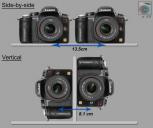
Please, support PV!
It allows to keep PV going, with more focus towards AI, but keeping be one of the few truly independent places.
It allows to keep PV going, with more focus towards AI, but keeping be one of the few truly independent places.
VK: Dual-body 3D Rig: rotate sensor scanning 90/270deg?
-
I've been shooting 3D video & stills with my dual-body 'GH2-3DD' for a while now. The results are stunning - but I'm now working on a project for large-screen projection (5m wide) and the large inter-axial (separation between lenses) from a side-by-side mount creates excessive 'deviation' (horizontal offset between objects). It's basically unviewable.
Beamsplitter rigs (aka mirror boxes) are the usual solution, but they have many problems: 1+stop light loss, large & heavy, issues with polarized light, fragile mirror etc.
A better solution to bring the lenses closer together is to mount the bodies vertically - but it's no good for video (portrait format + rolling shutter is scanning in opposing directions, a no-no for 3D). So the question @Vitaliy_Kiselev, is there any chance the sensor setup can be changed to reverse the X/Y scanning? So 1920x1080 becomes 1080x1920.
The shutter would also need to roll left->right on one body, and right->left on the other. ie. sensor scanning is 90 degrees rotated on one body, 270 on the other.
 GH2-Stereo-Rig-configs.jpg558 x 468 - 26K
GH2-Stereo-Rig-configs.jpg558 x 468 - 26K -
It'll happen only in your fantasy. :-)
I think that on any current CMOS sensor you can't do anything like it. -
How about reversing the rolling shutter bottom->top? (and then resizing the capture area 1080x1920)?
-
I think that this is also impossible on any sensors.
Despite that CMOS sensors are different, my current understanding is that most modern CMOS sensors are smart, so they can do basic pixel combining and translate only resulting RAW data.
They are not universal. -
Have you posted your insights of the sensor setup configurations anywhere and/or examples of a sensor setup I can study? You were able to change capture dimensions on the GH1 right?
-
>Have you posted your insights of the sensor setup configurations anywhere and/or examples of a sensor setup I can study?
Nope.
We have new development section closed from normal users in FAQs.
So, with time I'll put some info, as it allow me to publish some code with comments.
>You were able to change capture dimensions on the GH1 right?
Nope.
We changed few capture parameters, but never moved to anything really useful.
Setup is very complicated and is not located in one small place.
Plus huge number of other routines are hard coded to specific buffers, dimentions, aspects, etc.
-
Apparently the Alexa CMOS sensor can be scanned in reverse: http://www.arridigital.com/forum/index.php?topic=1464.0
"The readout from the sensor top to bottom takes 8 ms, no matter which frame rate you choose... Scanning Alexas sensor in reverse is possible - however, the implementation is not in our immediate timeline." -
>however, the implementation is not in our immediate timeline
Plus it is not common sensor.
This is thing having huge price. -
> We changed few capture parameters, but never moved to anything really useful.
Setup is very complicated and is not located in one small place.
Plus huge number of other routines are hard coded to specific buffers, dimentions, aspects, etc.
Makes sense. Of course the idea is to read the rotated (or just resized) data into the standard-sized buffer, so anything after the immediate readout/storage would not need to be modified.
Start New Topic


Howdy, Stranger!
It looks like you're new here. If you want to get involved, click one of these buttons!
Categories
- Topics List23,987
- Blog5,725
- General and News1,353
- Hacks and Patches1,152
- ↳ Top Settings33
- ↳ Beginners255
- ↳ Archives402
- ↳ Hacks News and Development56
- Cameras2,364
- ↳ Panasonic993
- ↳ Canon118
- ↳ Sony156
- ↳ Nikon96
- ↳ Pentax and Samsung70
- ↳ Olympus and Fujifilm100
- ↳ Compacts and Camcorders300
- ↳ Smartphones for video97
- ↳ Pro Video Cameras191
- ↳ BlackMagic and other raw cameras116
- Skill1,960
- ↳ Business and distribution66
- ↳ Preparation, scripts and legal38
- ↳ Art149
- ↳ Import, Convert, Exporting291
- ↳ Editors191
- ↳ Effects and stunts115
- ↳ Color grading197
- ↳ Sound and Music280
- ↳ Lighting96
- ↳ Software and storage tips266
- Gear5,420
- ↳ Filters, Adapters, Matte boxes344
- ↳ Lenses1,582
- ↳ Follow focus and gears93
- ↳ Sound499
- ↳ Lighting gear314
- ↳ Camera movement230
- ↳ Gimbals and copters302
- ↳ Rigs and related stuff273
- ↳ Power solutions83
- ↳ Monitors and viewfinders340
- ↳ Tripods and fluid heads139
- ↳ Storage286
- ↳ Computers and studio gear560
- ↳ VR and 3D248
- Showcase1,859
- Marketplace2,834
- Offtopic1,320





